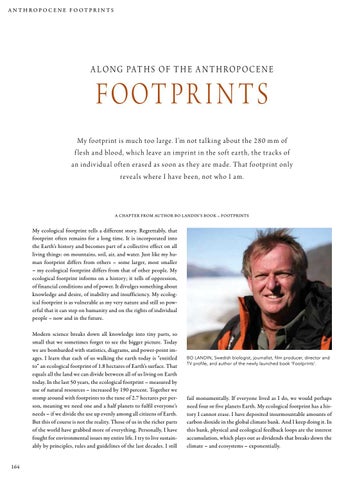ANTHROPOCENE FOOTPRINTS
A L O N G PA T H S O F T H E A N T H R O P O C E N E
FOOT PR I N TS My footpr i nt is much too la rge. I’m not ta l k i ng about t he 280 m m of f lesh a nd blood, wh ich leave a n i mpr i nt i n t he sof t ea r t h, t he track s of a n i nd iv idua l of ten erased as soon as t hey a re made. That footpr i nt on ly revea ls where I have been, not who I a m.
A CHAPTER FROM AUTHOR BO LANDIN’S BOOK – FOOTPRINTS
My ecological footprint tells a different story. Regrettably, that footprint often remains for a long time. It is incorporated into the Earth’s history and becomes part of a collective effect on all living things: on mountains, soil, air, and water. Just like my human footprint differs from others – some larger, most smaller – my ecological footprint differs from that of other people. My ecological footprint informs on a history; it tells of oppression, of financial conditions and of power. It divulges something about knowledge and desire, of inability and insufficiency. My ecological footprint is as vulnerable as my very nature and still so powerful that it can step on humanity and on the rights of individual people – now and in the future. Modern science breaks down all knowledge into tiny parts, so small that we sometimes forget to see the bigger picture. Today we are bombarded with statistics, diagrams, and power-point images. I learn that each of us walking the earth today is “entitled to” an ecological footprint of 1.8 hectares of Earth’s surface. That equals all the land we can divide between all of us living on Earth today. In the last 50 years, the ecological footprint – measured by use of natural resources – increased by 190 percent. Together we stomp around with footprints to the tune of 2.7 hectares per person, meaning we need one and a half planets to fulfil everyone’s needs – if we divide the use up evenly among all citizens of Earth. But this of course is not the reality. Those of us in the richer parts of the world have grabbed more of everything. Personally, I have fought for environmental issues my entire life. I try to live sustainably by principles, rules and guidelines of the last decades. I still 164
BO LANDIN, Swedish biologist, journalist, film producer, director and TV profile, and author of the newly launched book ‘Footprints’.
fail monumentally. If everyone lived as I do, we would perhaps need four or five planets Earth. My ecological footprint has a history I cannot erase. I have deposited insurmountable amounts of carbon dioxide in the global climate bank. And I keep doing it. In this bank, physical and ecological feedback loops are the interest accumulation, which plays out as dividends that breaks down the climate – and ecosystems – exponentially.


































